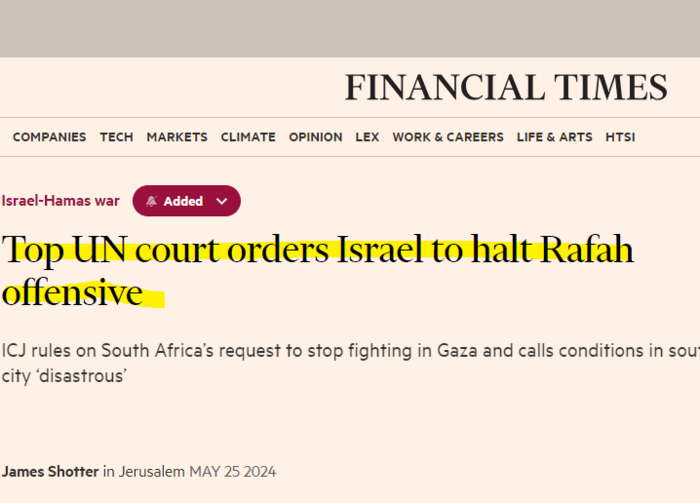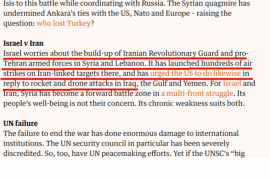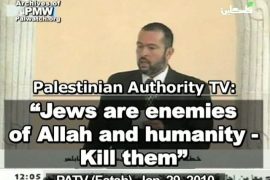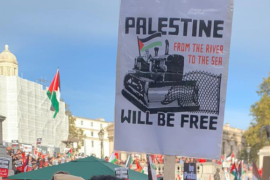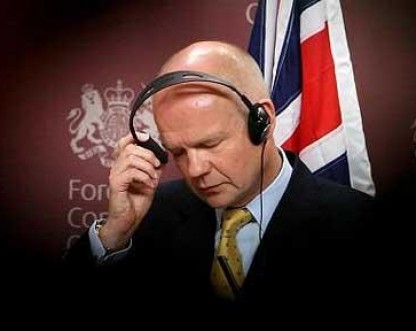A May 25th article in the Financial Times on an emergency ruling by the International Court of Justice (ICJ), as part of South Africa’s case accusing Israel of genocide, erred in both the headline, “Top UN Court Orders Israel to Halt Rafah Offensive”, and in the opening sentence:
“The UN’s top court has ordered Israel to ‘immediately halt’ its military offensive in Rafah, the southern Gazan city that had become a refuge for more than 1mn civilians since the war between Israel and Hamas erupted last year.
Crucially, as noted in an analysis of the decision by our colleague David Litman, the wording narrowly ordered Israel on Friday to “immediately halt its military offensive, and any other action in the Rafah governorate, which may inflict on the Palestinian group in Gaza conditions of life that could bring about its physical destruction in whole or in part.”
The ambiguity of the ICJ verdict’s wording, as well as the qualifying language, such as “that could bring…”, was interpreted by four ICJ judges as a limited order instructing the IDF to abide by the Genocide Convention during its activities in Rafah, but not requiring a complete halt to military operations there.
“The measure is a qualified one, which preserves Israel’s right to prevent and repel threats and attacks by Hamas, defend itself and its citizens, and free the hostages,” Aharon Barak, the ad-hoc judge representing Israel at the International Court of Justice, wrote in his minority opinion regarding the decision of the majority judges.
“The measure obliging Israel to halt the current military offensive in Rafah is conditioned by the need to prevent ‘conditions of life that could bring about [the] physical destruction in whole or in part’ of the Palestinian group in Gaza. Thus, this measure does not concern other actions of Israel which do not give rise to such a risk,” wrote German judge Georg Nolte, who joined the majority judges. This position was also supported by Romanian Judge Bogdan Aurescu and Judge Sebutinde.
The only judge who expressed a contrary position is the South African ad-hoc judge, Dire Tladi,
The FT article errs again, when it states “The court also ordered Israel to reopen the Rafah crossing between Gaza and Egypt..”, neglecting the fact that it’s Egypt, and not Israel, which is keeping the Rafah closing closed – a decision which elicited a rare rebuke of Cairo by US officials. In fact, after communication with CAMERA’s Israel office, Haaretz corrected an article which included that same false claim.
It’s not just FT who grossly mislead readers. Most British outlets, in fact, made the same error:
The Guardian promoted the same inaccuracy in a May 24th article , in both the headline, “UN’s top court orders Israel to immediately halt Rafah offensive”, and the text:
The UN’s top court has ordered Israel to halt its assault on the southern Gaza city of Rafah in a ruling that will ratchet up the pressure on the increasingly isolated country.
A May 24th article in The Times similarly got it wrong, also in the headline (“International Court of Justice orders Israel to halt Rafah offensive”) and the opening sentence:
The United Nations’ top court has ordered Israel to halt its offensive on Rafah in the latest in a string of diplomatic and legal moves against the country.
Sky News similarly erred in a May 24th article – in the headline, “International Court of Justice orders Israel to halt Rafah offensive”, and the opening sentence:
The International Court of Justice (ICJ) has ordered Israel to stop its military offensive in the southern Gaza city of Rafah.
Channel 4 News also erred in a May 24th report, in both the headline, “UN top court orders Israel to ‘immediately’ halt Rafah offensive”, and the first sentence:
The UN’s international court of justice has ordered Israel to halt its military offensive around Rafah in southern Gaza with immediate effect.
Finally, the Daily Mail similarly got it wrong in a May 25th article , in the wording of the headline, “Israel pummels Gaza including Rafah just a DAY after top UN court ordered IDF to halt its invasion of the southern city”, and in the opening sentences:
Israel has bombed the Gaza Strip, including Rafah, just one day after the top UN court ordered the IDF to halt its military operations in the southern city.
…
The International Court of Justice (ICJ) demanded the immediate release of all hostages still held by Palestinian militants hours after the Israeli military announced troops had recovered the bodies of three more of the captives from northern Gaza.
We’ll be complaining to these media outlets about their grossly misleading characterisations of the ICJ ruling.

